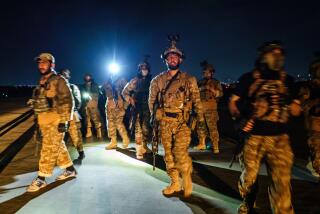Afghanistan in Africa
IT HAS BEEN OBSERVED THAT when the worldâs policemen are distracted by front-page conflicts, minor tyrants seize the opportunity to go on rampages. Thus, while news cameras dwell on the latest carnage in Israel and Lebanon, Somalia may be collapsing into a terrorist haven comparable to Afghanistan under the Taliban.
At first blush, the takeover of Mogadishu by Sunni militiamen last month might seem like the best thing to have happened to Somalia since it dissolved into anarchy 15 years ago. The Islamists disarmed a pack of U.S.-backed warlords -- who overthrew dictator Mohamed Siad Barre in 1991, only to unleash their own reign of terror and corruption -- and imposed something like law and order on a capital city that had seen neither for nearly a generation. Yet that discipline is looking increasingly like the kind Afghans remember all too well: the harshest form of Sharia, or Islamic law. As one example, two men were shot to death in Mogadishu for the crime of watching the World Cup on television.
The Islamic militia is headed by a known terrorist; its aims are unknown, but there are ominous indicators of trouble. Newsweek recently got hold of a militia training video in Mogadishu in which masked fighters refer to Somalia as the new Afghanistan and urge disaffected Muslims to gather there. The militiaâs internal newspaper featured a headline on July 3 saying terrorism was compulsory.
Last week, the Islamists began encroaching to within 20 miles of Baidoa, the headquarters of a warlord-controlled âgovernmentâ created two years ago with help from the United Nations in a failed attempt to gain some semblance of order. Officials in neighboring Ethiopia, vowing to protect this shell of a governing body, rashly moved troops into Baidoa. Given that majority-Christian Ethiopia and majority-Muslim Somalia have been warring off and on for more than a century, this has served only to increase support for the militia by mainstream Somalis.
Complicating matters is half-Christian, half-Sunni Eritrea, which won a tense independence from Ethiopia in 1991 and is believed to be supplying arms to the Somali Islamists. Then there are the clan loyalties that make Somaliaâs power struggles at least as much about ethnicity as anything else. Untangling this web makes making peace between Israel and Hezbollah seem simple.
There are some clear first steps, though. Ethiopia, which is making a bad situation worse, should be pressured to withdraw immediately. The Baidoa government, meanwhile, is on the verge of collapse; on Thursday, one-fifth of its cabinet resigned. It has no power outside the city and no real reason to exist. The U.N. and other groups, such as the African Union, should work with the more moderate elements of the Islamist camp and try to start over.
More to Read
Sign up for Essential California
The most important California stories and recommendations in your inbox every morning.
You may occasionally receive promotional content from the Los Angeles Times.










